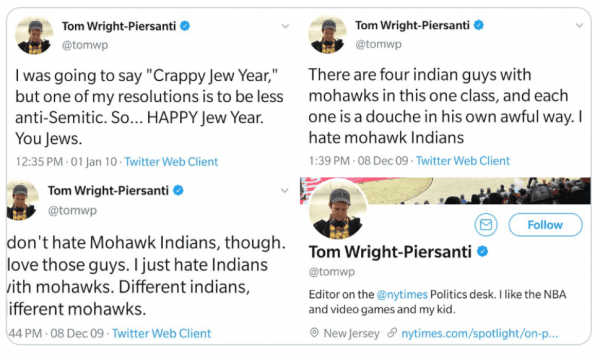BIGOTRY AT THE NEW YORK TIMES:Who knew about Tom Wright-Piersanti, and when did they know it?As Glenn pointed out here, Breitbart News discovered that Senior Editor Wright-Piersanti has been polluting social media with racist filth since at least 2009, possibly as early as 2007.
He apologized. And locked down his Twitter account. And as of this writing he inexplicably still works at the ̶T̶e̶m̶p̶l̶e̶ ̶o̶f̶ ̶R̶i̶g̶h̶t̶e̶o̶u̶s̶ ̶S̶a̶n̶c̶t̶i̶m̶o̶n̶y̶ The New York Times. He has been posting racist garbage for at least nine years. And it is only logical to assume that some, if not many of his workmates and even superior-ranking editors follow him on Twitter. Is it even remotely plausible that nobody at The Times followed Wright on Twitter and never saw his screeds? I don’t think so.
Which leaves us with the question that must be asked of each and every “Timesman” that worked there between 2007 and now: Did you know? Why didn’t you say anything? Margaret Sullivan was their Public Editor from 2012 to 2016. How could she have not known? Bill Keller was the paper’s Executive Editor from 2003 to 2011. Did he follow Wright-Piersanti? Did anyone complain to Keller about him? Did Jill Abramson, now under fire for alleged plagiarism by the paper at which she served as Executive Editor from 2011 to 2014 follow Wright-Piersanti?
Look, this isn’t a partisan issue, it’s an honesty issue. This episode is so parallel to the #MeToo movement it’s scary. Being Harvey Weinstein wasn’t bad enough. People were (rightfully, IMHO) being held accountable for looking the other way, for enabling, and even encouraging behavior that can’t be described as anything other than despicable.
So too, bigotry is despicable, and The New York Times has embarked on a campaign to remind us of this self-evident truth. Not only The New York Times, but its cadre, its core leaders and rank-and-file past and present have to be asked these questions. Heaven knows the “media watchers” from the same club won’t ask.
So I’m encouraging you and your friends to ask. Be polite, be direct, don’t use foul language or rabid hyperbole. The emails addresses for some of these people are (); () and (). This is not a call for harassment or doxxing. These people have made a living communicating with the public and have assumed the very genuine mantle of the public trust in so doing. Thus, asking them politely “what did you know and when did you know it?” is not just fair, but important, and like the #MeToo movement it starts with ordinary people speaking truth to power.

